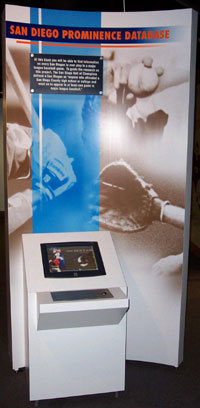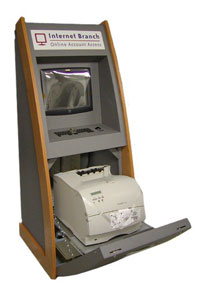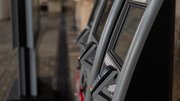Article
Customers may pay price for '`cheap' kiosk components
Kiosk vendors face the challenge of educating price-sensitive customers about the importance of selecting high-quality kiosk components. Customers who look too hard for a deal can end up paying two to five times more than they saved when it comes to the maintenance fees, help-desk support, shipment of replacement items and personnel associated with broken-down parts.
June 30, 2004
Kelly Mundell, general manager of kiosk-software company, HTS Interactive, just lost out on an RFP for 119 kiosk units. But he doesn't especially mind. The prospective customer had asked for inexpensive, consumer-grade components in the kiosks, and Mundell doesn't want to go there.
"One of my biggest challenges is explaining the importance of quality components to customers," he said. "I've lost jobs that I probably could've gotten if we sourced poorly. But I almost don't want those customers."
Mundell is not alone, especially in these tough economic times. Price is often a customer's first concern.
"It's the silliest mistake. I understand the need to cut costs. But this is not the place to do it. You just can't use cheesy keyboards and cheesy printers." --Francie Mendelsohn, president of Summit Research Associates |
In the case of the aforementioned RFP, the project winner came in $215,000 lower than the next-highest bid, according to Mundell. "I'm sure they sourced junk. There's no apples-to-apples comparison."
The key in these cases, Mundell and others pointed out, is educating customers about their options, and what they are getting for their dollars. He estimated that customers that look a little too hard for a deal can end up paying two to five times more than they saved when it comes to the maintenance fees, help-desk support, shipment of replacement items and personnel associated with broken-down parts. The self-service environment is unique, because there generally are not people around to fix equipment.
Mundell said sales calls should stress positive customer references and the value of the vendor as a reputable company, along with the quality of the solution. It's also helpful to find a champion at the prospective customer site; preferably someone who is on the bid-evaluation team.
 |
HTS Interactive's kiosk for the San Diego Hall of Champions |
The customer is always...
"Price has been an issue forever," said Frank Olea, vice president of Olea Exhibits/Displays Inc., which provides enclosures and project-shipping services to HTS. "We sell to 10 kiosk software companies and only a small number of them go with high-end components." He said he often doesn't want his company's name associated with some of lower-end projects.
Other vendors agree. "I talk to so many customers who are hesitant to spend a lot on kiosk components after they have just invested a lot of money into the kiosk enclosure," said Karin Kosterlitz, sales and marketing specialist for printer vendor Swecoin US Inc. "They feel components are all the same, and that they should purchase the least expensive components to save money, not realizing that the components are cheap for a reason."
Kosterlitz said customers going cheap get what they pay for -- a lot of headaches.
"After going this route, customers discover they face more problems with the cheaper model than if they had invested in the superior product in the first place," she said. "At least the higher-cost model is often backed by good customer service and technical support."
|
Kosterlitz said volume pricing for Swecoin printers ranges from mid-$300 for the smallest printer in large quantities, to about $1,000 for the wide-format printer in quantities of a couple hundred. Single quantity prices are higher.
"Mainstream competitors are in about the same range. `Cheap' models can go for as little as $300, but they lack features that are critical elements for operation or are of inferior quality. They might lack the looping presenter, have a less robust print-head, lack a cutter, lack a Windows drivers or have a smaller paper roll-holder," she said. They often don't offer the same level of service and support.
Mundell underscores that point. "We don't want to sell a kiosk and walk away. We want to have a partnership with our customers and work with them to maintain and update their units for the long term."
Francie Mendelsohn, president of Summit Research Associates Inc., said this topic is a real hot button for her. "I preach high quality all the time. If you are going to go cheap, don't get into this business at all."
 |
Olea's high-end Manhattan kiosk |
Key issue
Mendelsohn said that the biggest area in which customers cut corners is with keyboards. "It's absurd," she said, citing an AOL Germany kiosk that is "beautiful and sexy" but sports a "cheesy $20 plastic keyboard."
She said letter caps can instantly pop off an inexpensive keyboard, and then not only is the keyboard not working, the kiosk is not generating revenue.
"It's the silliest mistake. I understand the need to cut costs. But this is not the place to do it," she said. "You just can't use cheesy keyboards and cheesy printers."
Said Mundell, "If we see there is no baseline for an RFP and best cost is the judge, we might walk away. If they are talking plastic keyboards, we won't submit."
Keep it clean
A large, nationally known rug-cleaning company is talking with both HTS and Olea about a potential kiosk deployment. But the companies still have not come to terms on price.
Mundell said the company, which rents carpet cleaners to consumers, wants kiosks for under $1,000 each. "They set this arbitrary price because they saw cheap printers, computers and monitors on the Internet," said Mundell. "I went back to them two or three times saying I just couldn't do it."
Olea said the strategy in selling this customer on the right kiosks is putting the options on a table, side by side. "We've told them we can do what they want, but we're up front about the future issues," he said.
Added Mundell, "They really need to think about the fact that if they are using kiosks to take customer orders and those kiosks aren't working, it'll kill their business."
[Editor's note: Info Touch Technologies became Tio Networks in April 2006.]
 ChatGPT
ChatGPT Grok
Grok Perplexity
Perplexity Claude
Claude This story and all the great Free content on KIOSKmarketplace.com is supported by
This story and all the great Free content on KIOSKmarketplace.com is supported by 











